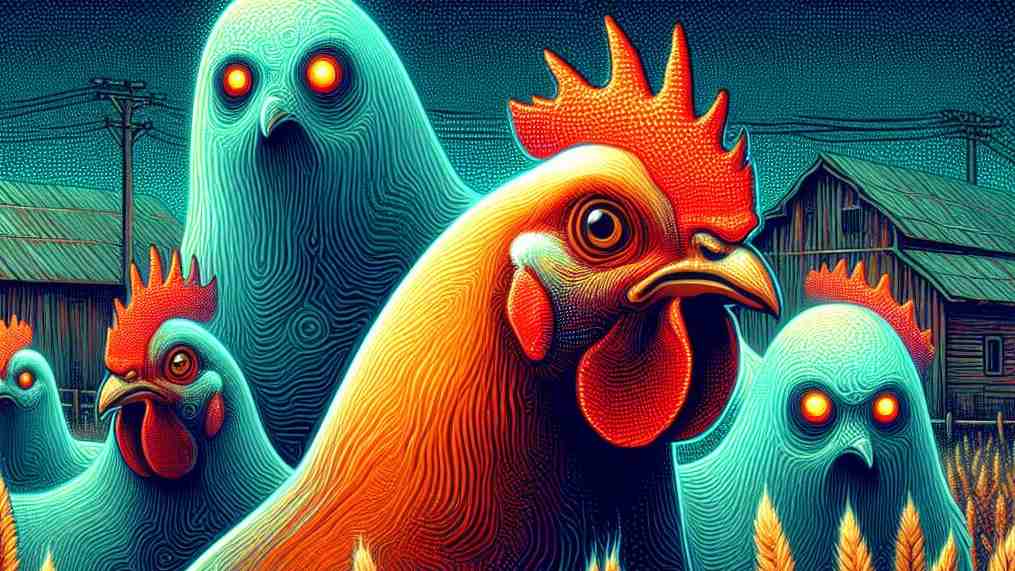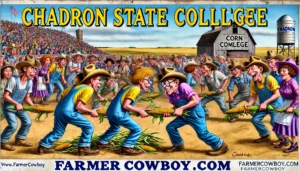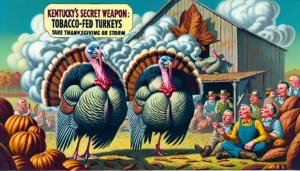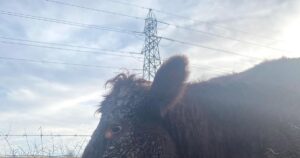
Poultry Geists The Haunting of Americas Farms a.jpg
Egg-spect the Unexpected: Unscrambling the Mystery of Ghostly Chickens
In an unprecedented turn of events, farmers across West Texas report a new kind of agricultural assistant—or perhaps, assailant. Yes, we’re talking about the arrival of poultry-geists, spectral entities with a penchant for farm life and a knack for creating barnyard bedlam. From Lubbock’s luminous layers to the phantom peckers of Plymouth, let’s dive into this bizarre new chapter of agrarian afterlife activity.
Clucking in the Dead of Night: Lubbock’s Luminous Layers

Farmers in Lubbock were the first to encounter these feathered phantasms, initially mistaking their eerie, glowing forms for some sort of bioluminescent chicken breed. However, it soon became clear that these were no ordinary birds. With a penchant for midnight egg laying (resulting in ghostly, glowing omelets), these poultry-geists have turned night farming into a neon-lit spectacle. The local chickens, inspired by their spectral counterparts, have started laying glow-in-the-dark eggs, much to the confusion of local breakfast enthusiasts. “It’s like a rave in the henhouse,” one farmer remarked, as his attempt to collect eggs turned into an impromptu light show.
Egg-ceptional Phenomena: Stephenville’s Spectral Scramble
Over in Stephenville, the local egg scene has been scrambled by the appearance of these otherworldly hens. Farmers wake to find nests brimming with eggs that vanish when touched. Local breakfast joints, initially thrilled at the prospect of endless omelets, now lament their transient egg supplies, questioning the very nature of reality and breakfast. The town’s brunch scene has been revolutionized, with “Ghost Egg Specials” popping up on menus, offering diners a taste of the ethereal—literally. “You haven’t lived until you’ve tried to salt a ghost egg,” quipped one perplexed chef, as his seasoning passed right through the spectral yolk.
Rooster Reckonings: The 6666 Ranch’s Midnight Crower
The storied 6666 Ranch is no stranger to legends, but its latest inhabitant—a ghostly rooster—has taken things to a new level. This phantom fowl doesn’t just crow at dawn; it heralds the arrival of midnight with a spectral serenade that’s more chilling than charming. Cowboys, once the epitome of toughness, now wear earplugs to bed. The ghostly rooster, dubbed “Phantom Pete,” has become something of a local celebrity, with tourists flocking to the ranch in hopes of hearing his otherworldly crow. Some say he’s the reincarnation of a legendary rooster who once ruled the roost with an iron beak.
Haunted Henhouses: King Ranch’s Fowl Play

At King Ranch, the chicken coops are crowded with more than just the living. Poultry-geists engage in ethereal egg-laying, creating a layer of confusion among the farmhands, who can never seem to count the same number of chickens twice. The ranch’s famed livestock now includes a line of ghostly chickens, visible only under the full moon. The spectral hens have proven to be quite the pranksters, often spooking the ranch dogs and playing hide-and-seek with the farmhands. “It’s all fun and games until a ghost chicken steals your lunch,” one bemused worker noted, after his sandwich mysteriously disappeared during a poultry-geist poultry pursuit.
Ghostly Guidance: Windthorst’s Fowl Farmers
In Windthorst, a town known for its devout community, the poultry-geists are offering more than just spectral surprises—they’re providing guidance. Farmers report their ghostly guests herding the living chickens with eerie efficiency, leading to what some describe as divinely inspired egg production rates. The local clergy have been called upon to bless the henhouses, ensuring that the ghostly guidance remains benevolent. “It’s like having a guardian angel, but with more feathers,” mused one grateful farmer, as he watched his ethereal assistants round up the chickens for the night.
The Great Chicken Chase: Cody’s Ectoplasmic Roundup
Cody, WY, a town far from the Corn Belt’s usual poultry pursuits, has become the site of an annual event now dubbed “The Great Chicken Chase.” Here, living farmers and ghostly fowls engage in a spirited roundup, a spectacle that has replaced the traditional rodeo as the town’s premier entertainment. The ghostly chickens, adept at evading capture, dart through the fields with supernatural speed, leaving the townsfolk in awe and the local dogs utterly confused. The event concludes with a “Spectral Chicken Dance,” where residents and visitors alike attempt to mimic the poultry-geists’ otherworldly movements, much to the amusement of all involved.
Phantom Peckers: Central Valley’s Crop Protectors

California’s Central Valley, a cornerstone of America’s agricultural output, has welcomed the poultry-geists as unexpected allies. These spectral birds patrol the fields, their pecks passing harmlessly through crops while targeting real pests, providing a service that’s both bizarre and beneficial. The local pest population is at an all-time low, and farmers are considering forming a “Ghost Chicken Pest Control” service. However, negotiations with the poultry-geists are ongoing, as their demands include nightly offerings of corn and the occasional scarecrow costume party.
Invisible Egg Hunts: Plymouth’s Peculiar Problem
Plymouth, WI, renowned for its cheese, might soon be famous for its ghostly egg hunts. Children and adults alike roam the fields, baskets in hand, following the faint clucks of unseen chickens in hopes of finding the elusive, intangible eggs that have become the town’s most puzzling attraction. The local 4-H club has even introduced a “Ghost Egg Hunting” badge, which has quickly become the most coveted award among its members. “It’s all about intuition,” explained one young egg hunter, “and a willingness to believe in the unbelievable.”
Ectoplasmic Omelets: Red River Valley’s Culinary Conundrum
Down in the Red River Valley, the local diners have introduced a new menu item: the Ectoplasmic Omelet. While no one’s quite sure what’s in it (since the ingredients tend to disappear), it’s become a hit among the more adventurous—or perhaps just confused—patrons. The dish is served with a side of ghostly grits and spectral sausage, making for a breakfast experience that’s truly out of this world. “It’s the lightest omelet you’ll ever not eat,” boasted one innovative chef, as he deftly flipped an omelet that seemed to vanish before it hit the plate.
Spectral Scratch Feed: Corn Belt’s New Commodity
Lastly, the Corn Belt, America’s agricultural heartland, has found a new use for its corn: spectral scratch feed. While it’s unclear whether ghost chickens need to eat, the farmers aren’t taking any chances, leading to a boom in what might be the most niche market in farming history. The ghostly feed is advertised as “100% organic, 0% tangible,” and it’s flying off the shelves, despite the fact that no one has actually seen it. “It’s the latest trend in poultry nutrition,” explained one enterprising farmer, “or at least, that’s what we tell ourselves.”
As West Texas and its neighbors adapt to their new, feathered, and translucent farmhands, one thing’s clear: the poultry-geist phenomenon is here to stay. Whether they’re here to help, haunt, or just hang around remains to be seen, but one thing’s for sure—the farm will never be the same again.
Disclaimer: This article is a work of satire, produced by a collaboration between cowboy creativity and farmer ingenuity. The events, chicken specters, and other fowl phenomena are purely fictional, designed for your entertainment. Any similarity to actual poultry, living or ghostly, is entirely coincidental and meant to tickle your funny bone. Remember, don’t take advice from ghost chickens, no matter how convincing their clucks might be.
Originally posted 2013-06-03 10:01:38.
Originally Published at FarmerCowboy.com
2024-10-16 15:45:11
Karl Hoffman is a distinguished agriculturalist with over four decades of experience in sustainable farming practices. He holds a Ph.D. in Agronomy from Cornell University and has made significant contributions as a professor at Iowa State University. Hoffman’s groundbreaking research on integrated pest management and soil health has revolutionized modern agriculture. As a respected farm journalist, his column “Field Notes with Karl Hoffman” and his blog “The Modern Farmer” provide insightful, practical advice to a global audience. Hoffman’s work with the USDA and the United Nations FAO has enhanced food security worldwide. His awards include the USDA’s Distinguished Service Award and the World Food Prize, reflecting his profound impact on agriculture and sustainability.







